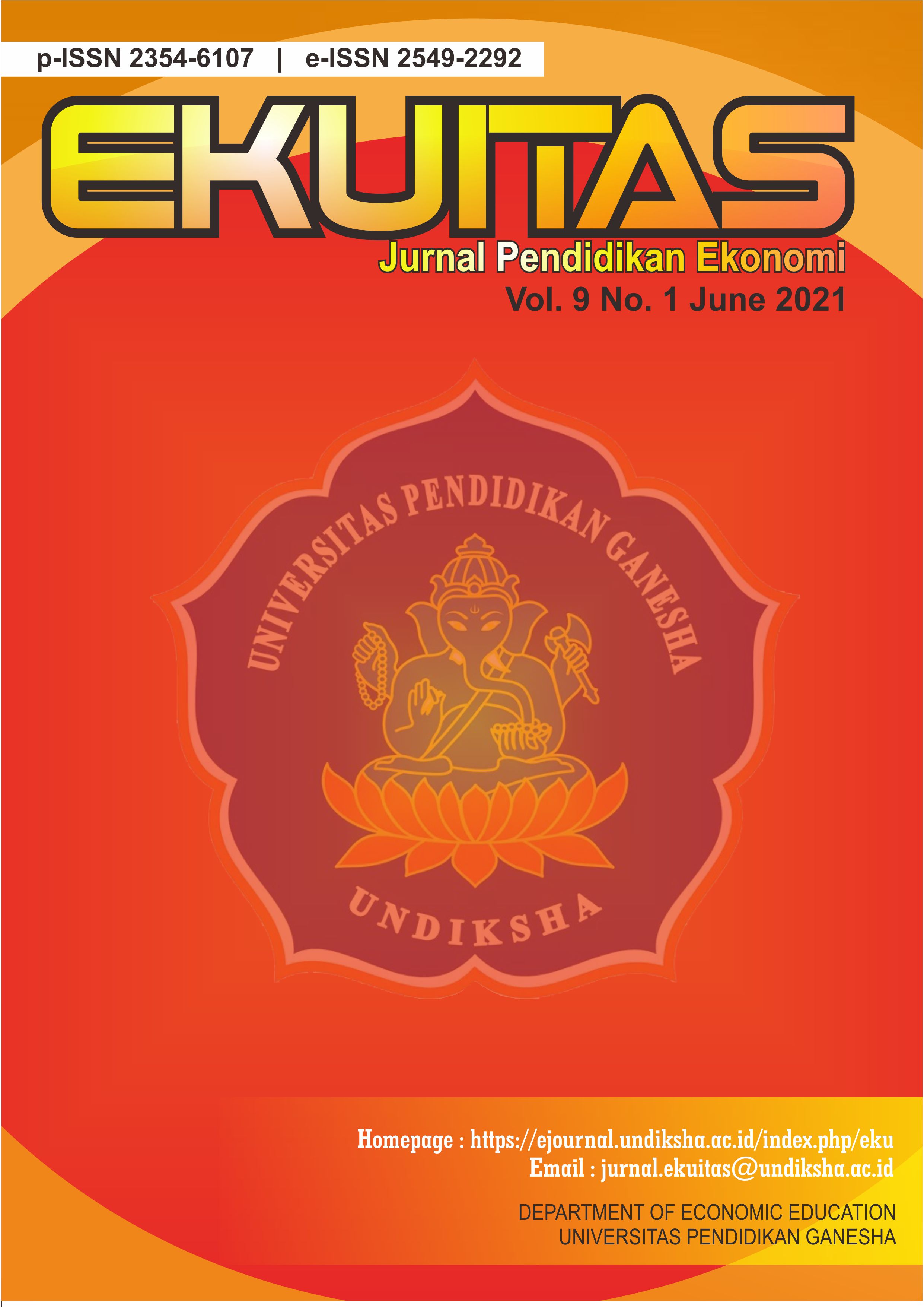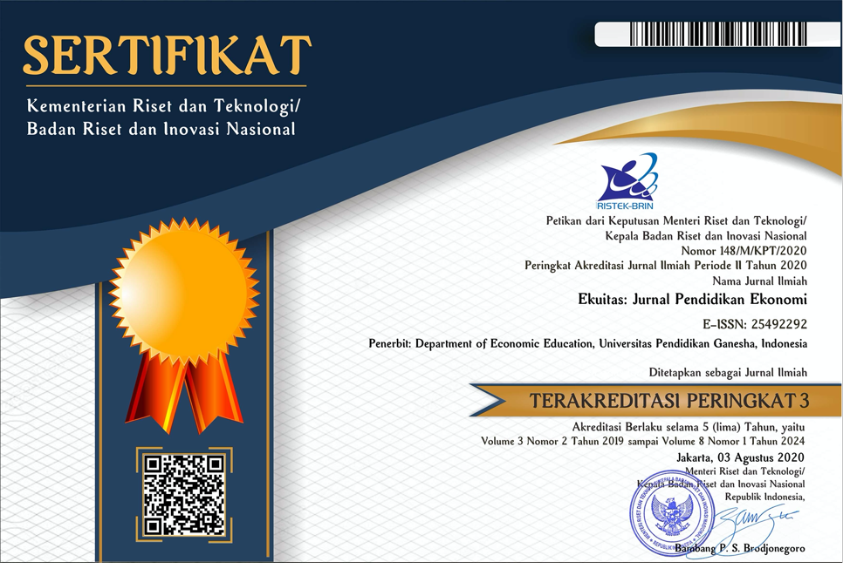Implementasi Model Pembelajaran Patriot untuk Mengembangkan Kemampuan Mengelola Usaha Mahasiswa
DOI:
https://doi.org/10.23887/ekuitas.v9i1.35966Keywords:
ability to manage business, digital learning, e-learning, learning patterns, partnersAbstract
This study was conducted to explore the existence of entrepreneurial learning patterns that can be used to develop students' business management skills through the implementation of the PATROT model after the COVID-19 pandemic. This effort was carried out through the implementation of the PATRIOT model with five online class facilities, an entrepreneurship laboratory, and field observations for the Undiksha Young Entrepreneur Association (YES) group. Field activities are based on the idea that increasing the ability to innovate creatively, the courage to face risks, and turning challenges into opportunities are the basic characteristics that shape the entrepreneurial behavior of college graduates. Learning activities are carried out by integrating activities in the Undikaha e-learning class (synchronous and asynchronous) and through SIPEJAR FE UM. This exploratory research was conducted in 5 classes of FE Undiksha Singaraja students, and 5 classes of partner students of FE UM offering 2020 who took the Entrepreneurship course. Data were obtained through document review and student questionnaires about the effectiveness of learning which were analyzed descriptively according to the characteristics of the information and content analysis according to the message content. The results of the study indicate that there are five components of learning activities that can be integrated or combined to develop the ability to take business actions. The five components are: online information search, learning interaction (synchronous vs asynchronous), job training (group vs independent), assessment (process vs outcome), and feedback and follow-up. The results of the study indicate that the ability to manage a business can be improved through a cooperative mechanism in group work, with the supervisor and project partners. The findings of this study should be continued by testing the effectiveness of learning patterns and scenarios for integrating online work activities, KWU laboratory assignments and business partnerships with practitioners.References
Adel, H.M., Mahrous, A.A. and Hammad, R. 2020, "Entrepreneurial marketing strategy, institutional environment, and business performance of SMEs in Egypt", Journal of Entrepreneurship in Emerging Economies, Vol. 12 No. 5, pp. 727-746. https://doi.org/10.1108/JEEE-11-2019-0171
Alqoot, A.R.M. 2021. Professional development of the performance of faculty members in the field of dealing with entrepreneurship distance learning platforms in light of the corona pandemic (Covid-19). Journal of Entrepreneurship Education, 24(3). Volume 24, Issue 3, 2021
Anthony, S.D. 2014. The first mile: A launch manual for getting great ideas into the market. Harvard Business Review Press.
Aulet, B. 2013. Disciplined entrepreneurship: 24 steps to a successful start-up. John Wiley & Sons.
Corbett, A. 2005. Experiential learning within the process of opportunity identification and exploitation. Entrepreneurship Theory and Practice, 29(4), 473-491.
Dernti, Michel. 2011. Web Templates as Visual Specifications of Blended Learning Support. Department of Computer Science and Business Informatics. Vienna University, Australia. Download 21Maret 2011. Sources http://www.pdfstock.com/web-templates-as-visual-specifications-of-blended-learning-support-pdf.html
Esfandiar, K., Sharifi-Tehrani, M., Pratt, S. & Altinay, L. (2017). Understanding entrepreneurial intentions: A developed integrated structural model approach. Journal of Business Research.
Fayolle, A., Gailly, B. & Lassas-Clerc, N. 2006. Assessing the impact of entrepreneurship education programmes: A new methodology. Journal of European Industrial Training, 30(9), 701-720.
Garba, M Musa and Shamsu Lawan Abubakar. 2019, Open Journal of Business and Management, 7, 1244-1261 http://www.scirp.org/journal/ojbm ISSN Online: 2329-3292 ISSN Print: 2329-3284 DOI: 10.4236/ojbm.2019.73087 Jul. 12, 2019 1244 The Influence of Entrepreneurial Learning Environment and Intrinsic Learners’ Need on Entrepreneurship Education
Gay, L. R., Geoffrey E. Mills, And Peter Airasian.2008. Educational Research: Competencies For Analysis And Applications. Upper Saddle River: Pearson Education, Inc., 2008.
Handayati, P; Dwi Wulandari; Budi E.S; A.Wibowo dan B.S, Narmaditya, 2020, Does enytepreneurship education Promote vocational students. Heliyon. Journal Homepage:www.cell.com/heliyon
Išoraitė, M., Gulevičiūtė, G. 2021. A Study of Entrepreneurship Education in Internet Space in Pandemic Conditions, Entrepreneurship and Sustainability Issues, 8(3), 179-192. http://doi.org/10.9770/jesi.2021.8.3(10)
Liguori, Eric and Christoph W., 2020, From Offline to Online: Challenges and Opportunities for Entrepreneurship Education Following the COVID-19 Pandemic. Entrepreneurship Education and Pedagogy, Vol. 3(4) 346–351 Article reuse guidelines: sagepub.com/journals-permissions DOI: 10.1177/2515127420916738 journals.sagepub.com/home/eex
Ogundele, OJK, Akingbade D.A; dan Akinlabi, HB ,2012. ‘Entrepreneurship Training And Education as Strategic Tools For Poverty Alleviation In Nigeria’, American International Journal of Contemporary Research Vol. 2 No. 1; January 2012
Rasmussen, Einar ,2011.Understanding academic entrepreneurship: Exploring the emergence of university spin-off ventures using process theories International Small Business Journal. 29: 448. SAGE Publication
Ratten, Vanessa ,2020. Coronavirus (covid-19) and entrepreneurship: changing life and work landscape. Journal of Small Business & Entrepreneurship Volume 32, 2020 - Issue 5. Pages 503-516 | Received 29 Jun 2020, Accepted 30 Jun 2020, Published online: 21 Jul 2020 Download citation, https://doi.org/10.1080/08276331.2020.1790167
Secundo G , P. Rippa, and Michele Meoli, 2020, Digital transformation in entrepreneurship education centres: preliminary evidence from the Italian Contamination Labs network. International Journal of Entrepreneurial Behavior & Research Vol. 26 No. 7, 2020 pp. 1589-1605 Emerald Publishing Limited 1355-2554 DOI 10.1108/IJEBR-11-2019-0618
Suharsono, Naswan , 2018. Pendidikan Kewirausahaan. Dari Teori ke Aplikasi. Tangerang: Penerbit Raja Grafindo
Suharsono, Naswan dan Parma, I Putu Gede, 2020. Post-Pandemic Web-Based Product Marketing: Developing Micro and Small Enterprise Culture. Proceedings of the 5th International Conference on Tourism, Economics, Accounting, Management and Social Science (TEAMS 2020). Advances in Economics, Business and Management Research, Volume 158. https://doi.org/10.2991/ aebmr.k.201212.044








